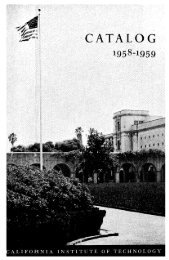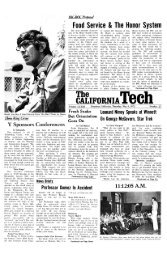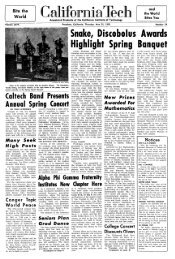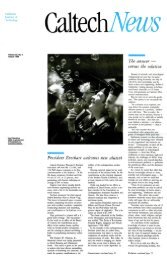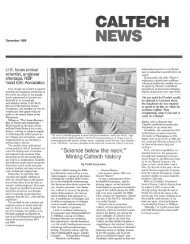PDF (1941) - CaltechCampusPubs
PDF (1941) - CaltechCampusPubs
PDF (1941) - CaltechCampusPubs
Create successful ePaper yourself
Turn your PDF publications into a flip-book with our unique Google optimized e-Paper software.
STUDY AND RESEARCH AT T HE CALIFORNIA INSTITUTE 1 I I<br />
tunities for more specialized study and research leading to the degree<br />
of Doctor of Philosophy are provided at the Institute in the fields of<br />
inorganic, analytical, physical, and organic chemistry.<br />
First year chemistry, which is taken by all freshman students of<br />
the Institute, puts special emphasis on the fundamental principles of<br />
chemistry. For two terms this subject centers around the chemistry<br />
of acids, bases, salts, metals, and non-metals. The third term is<br />
devoted to elementary qualitative analysis, accompanied by special<br />
lectures in various fields of chemistry given by staff members of the<br />
division. Provision is made for the execution in the laboratory of<br />
interesting and fruitful experiments closely coordinated with the<br />
lectures and classroom discussions.<br />
The second-year work in chemistry, which is taken by all students<br />
in the course in science, consists on the laboratory side of gravimetric<br />
and volumetric, advanced qualitative, and electrometric analysis; in<br />
the class work emphasis is placed on the principles relating to massaction,<br />
the ionic theory, oxidation, and the periodic law. In the<br />
second and third terms, and also in the subjects of physical and organic<br />
chemistry taken in the later years, the abler students, after a few weeks<br />
of introductory work, may undertake minor researches in place of the<br />
regular laboratory work.<br />
The chemical subjects of the junior and senior year consist of<br />
courses in physical, advanced inorganic, organic, and applied chemistry.<br />
The junior and senior courses in physical chemistry, here known<br />
as "Chemical Principles," are not descriptive courses of the usual type;<br />
but from beginning to end are presented as a series of problems to be<br />
solved by the student. Problems are a feature in the subjects of<br />
organic and applied chemistry also.<br />
The supervision of the research work of graduate students is distributed<br />
among the members of the staff of the Division of Chemistry<br />
and Chemical Engineering. Some of the many fields in which<br />
researches are being actively prosecuted are listed on page 207.<br />
The fifth-year course in Chemical Engineering leads to the degree<br />
of Bachelor of Science in Chemical Engineering, as distinguished from<br />
the Bachelor of Science degree without designation received for com-








